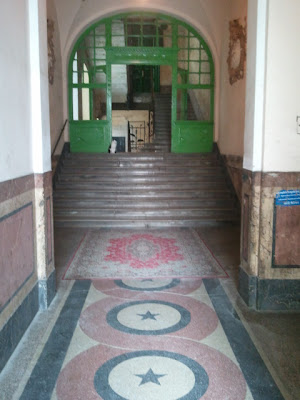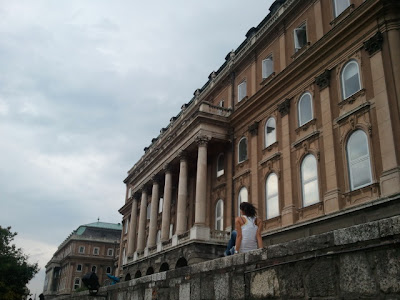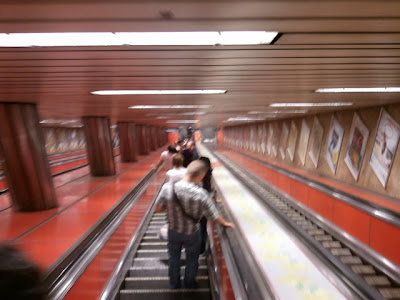You may have noticed there was a big delay in my Hungary account. This is because of a slightly tragic mishap involving my use of the “Cut and Paste” feature of my word processor wherein I forgot to do the “paste” part before doing more “cutting”. In other words, I lost my entire [rather cleverly written, naturally] account and notes about Hungary. I was so upset about it that I just put the re-write on hold. Sadly, I have forgotten several of the cool things I originally included, so I can only share about half of what I wanted to. Let us begin, then:
Buda and the Pest
Budapest (pronounced “boo-dah pesht”) was formerly two cities on opposite sides of the Danube, Buda and Pest. Now, it’s simply a gigantic metropolis. I mean seriously, it is way bigger than I expected it to be. When I arrived in town and consulted a map, my hostel appeared to be about a 15 minute walk. Arriving at my hostel 40 minutes later, I had a new respect for the scale of the town. My fellow hostellers regularly commented that they experienced the same thing. So yeah, in my three days, I got some serious walking in and still left much of the city unseen.
What I saw, however, was really impressive. Budapest was on track to be a real world capital until the Nazis and Commies had to come and wreck it. Magnificent architecture on a grand scale was prolific, even constant. These people really took the time to build a city they could be proud of. Had Hungary remained free in the second half of the twentieth century, I’m convinced it would enjoy status right up there with Paris, London, and Rome. It is a grand city. I even have no problem calling it the Paris of Eastern Europe.
But it is also a weary city. Everywhere you go, you see the scars of its past behind the Iron Curtain. The magnificent buildings and monuments simply look worn, like they’ve lived a hard life. The people have yet to completely recover from their oppressed pasts, either. Budapest fails to burst with life like so many of the other places I’ve visited. They are putting in a great effort to become a cultural gem, but it doesn’t seem to come naturally to them.
 |
| Entrance to my hostel. Loving the Communist motif |
 |
| My hostel building from the street |
 |
| This cafe was the top floor of a bookstore! B&N will never look the same to me |
 |
| A bit of a close-up of the above cafe ceiling |
 |
| From the Terror Museum, which showed life under oppressive Communist rule. I wanted to cry when I saw how horribly humans treated other humans. This is a real tank, not a model. |
 |
| To the subway. Even the metro entrances had so much style in Budapest |
 |
| Notice statue of Ronald Reagan, whom Hungary considered a true ally |
 |
| This is just the back side of Hungarian Parliament. With a bizarre twist. No really, I accidentally twisted my camera while trying to take a panoramic pic |
 |
| Buda as seen from Pest. |
 |
| Details like this in the building stones abounded |
 |
| It's worth the time to click on this and read the sign |
 |
| This is the backside of Buda. Suburbs, if you will. |
 |
| I've never seen such cartoony lettering on a sculpture |
 |
| The front side of Parliament. Rain was coming in, hence the grayness. And me being soaked (not shown) |
 |
| Pest as seen from Buda |
 |
| A palatial . . . palace |
 |
| In a nicer shopping part of town |
 |
| A scene from the marketplace (Seen below) |
 |
| Just a fraction of the gigantic-est indoor market |
 |
| An impossibly deep metro station! This picture was taken about 1/5 of the way down |
In a talk with the hostel owner, who is an Australian ex-pat, I learned that corruption runs rampant in Hungary, including the large and feared mafia, and layer upon layer of archaic communist-era bureaucracy smothers entrepreneurship. The city is divided, too: those from before my generation are often at odds with their younger neighbors. An interesting example is the noise curfew. After 9 pm, the authorities clamp down on people being loud in the streets. At my hostel, even, the management constantly reminded the guests that we must not talk AT ALL when in the stairwell, because if the neighbors complained, the hostel could be shut down. Make of this what you will. It’s a minor detail, but its very existence in a modern city seems majorly out of place.
 |
| The staircase of silence |
Food
Yes, I ate Goulash. Although it’s a national treasure of sorts, and I went to a somewhat legendary place to buy mine, it’s still just stew, if you ask me. The use of paprika as a spice also puzzles: could there be a less flavorful flavor? Yet it’s everywhere. I even put extra on my food and still failed to notice anything other than its bright red coloration. And then there’s the other local delicacy, “Langos”. Each time I asked people what local food I could try, something authentic and unique to the area, I was directed to try langos. When I finally found some, I laughed inside. It’s another fried bread item! Picture a funnel cake, or elephant ear, or bannock, fry bread, or even socca, or any other such thing, make it partly from potato flour, and you have langos. I don’t know whether to be amused or dismayed. I had one, naturally, but one was more than enough.
 |
| Langos |
 |
| Goulash |
The rest of the food I tried was little better. I mean, nothing was poorly made, but the recipes themselves were usually quite simple, things I would describe as peasant food. Simply saucy stews seemed standard. Sweetly, the area in which the Hungarians did excel was in their pastries. I mean wow, they really had some delicious and creative delicacies, stuff I’ve never seen. The pastry chefs in Budapest are true artisans. I would say that even a French pastry chef would be nervous in a pastry showdown.
 |
| Paprikash chicken, cucumber and beet salads. Sadly, no pics of awesome pastries, sorry :( |
White bread
This heading is a double entendre. Yes, they eat a lot of white bread in Budapest. Whole grain breads are a little rare. But the people themselves are also the whitest of anywhere I’ve ever been. Budapest is surely the least ethnically diverse major city in Europe. I spoke about it to the hostel owner, an Australian who has lived in Budapest for years. He says he has seen “all three black people” who live in Budapest (!). It’s not that Hungary is unwelcoming of outsiders, I’m told, but because they don’t have a booming economy and welfare state. Even the gypsies seem to have chosen greener pastures than Hungary, which is odd, considering that Hungary is more the area they are from.
I did find it peculiar that Norway is teeming with immigrants from Africa and the Middle East, but Hungary has a real scarcity of them; Hungary is a lot closer to both, with better weather. Wouldn’t “refugees” – who, according to their stories, are merely fleeing a horrible home – be content to settle in the nearest place they can safely live? I know that correlation is not sufficient to attribute causation, but I don’t consider myself overly cynical when I point out that Hungary has virtually no taxpayer-funded welfare system, but Norway’s is the best in Europe. I’ll let you ponder that while I move on to another topic.
People
In Budapest, more than anywhere else I’ve traveled, the people keep to themselves. And unlike in Norway, where people are happy to chat once approached, the locals actually seemed uncomfortable (or even irritated) talking to strangers. Customer service was a joke in most places, and you typically must hunt down your waiter in a restaurant for each stage of your meal, even to pay.
In an interesting aside, the sole time a local was warm and bubbly was (I’m quite certain of this, as was the fellow from my hostel I was walking with) when someone was trying to rob me, or at least pick my pocket. I’ll spare you all the details, but it wound up being the first time in my life I’ve actually thrust my hand in a stranger’s chest while using a four-letter word to get my point across. He may not have known English, but he and his shady sidekick got the message.
Another completely mundane but fascinating aspect of the people is this: there is virtually no jaywalking in Budapest. Not in the middle of the streets and not against a red pedestrian light, even when no traffic approaches. I wonder if the people are a law-abiding people in general (a vestige of the brutal rule of their former governments?) or if they simply don’t trust the crazy drivers. Oh, and speaking of crazy drivers: I thought the Nicois people were expert parallel parkers, but in Budapest, they defy physics. I never watched it done, but I saw some cars parked so close to each other that I was sure the only way they could get in or out of their parking spots was by hiring a forklift to insert them in the spot. Come to think of it, there was a fair amount of paint missing on people’s bumpers . . .
Failure to Bathe
You’ve likely heard of the amazing public mineral baths in Budapest. I was excited to try them, with their majestic stone columns and magically smelly waters of life guaranteed to teach you all the Secrets of the Universe. I bought a ticket from my hostel and folded my swim trunks and towel under my arm, ready to taste Heaven on Earth. As I was setting out at 6:30 pm, the hostel manager (whose assistand manager had told me that the best time to go is in the evening) warned me that they start shutting down the best parts of the baths at 7pm, and that I should really go first thing in the morning. So I changed my plans.
That night, I got to bed at about 2am and set my alarm for 5:30. I needed to hit those baths that morning, because my outgoing flight left a little after noon. A half-hour’s quick march later, I arrive at the baths, which looked like a glorious palace. I could smell the sensually sulfuric stench fragrance of the baths from afar and was already feeling my soul and spirit beginning to burst with eternal bliss. This would be the perfect send-off, I could tell.
I was turned away. Ticket not good until 9am, even though the baths open at 6. At least it was a fairly tranquil walk back. I sold my ticket to another hostel-goer (who wanted to go at midday) at a reduced price rather than trying to talk any sense into the inept hostel staff.
This was a good picture of Budapest, actually. Unaccommodating and unapologetic. They often seem to expect you to just be a good comrade. Another great cultural learning experience.
 |
| Someone else's photo from the internet |
 |
| I almost bathed here! |
From Middle Europe to the Middle East
And with that, it was on to the airport, which had the least concerned customer check-in I’ve ever seen. It took an hour and a half to advance about 20 places in line. I actually thought I might miss my plane because they were so slow. Security was also the least concerned I’ve seen, and they took no time at all to let people into the gate. When the plane finally began boarding (late, naturally), it was pretty hilarious. Exiting the gate, passengers all crowded onto three busses, standing room only. It took over 10 minutes to get on the bus and get dropped off at the plane. The plane was perhaps 100 meters away from where we boarded the bus. So awesome. Extra awesome was the couple next to me who coughed repeatedly at about 20 second intervals (both of them) without even attempting to cover their mouths. I beat a hasty retreat to a different part of the bus.
The plane, however, was great. I flew on Germanwings, a budget airline that was as comfortable (or more) than most regular airlines I’ve flown on. Highly professional and highly recommended. I was quite disappointed, however, by the uncomfortably hard bulge in the lumbar area of my seat. Who designs such uncomfortable seats for airplanes??? Several minutes into my flight, the bulge disappeared. Turns out it was somebody’s knee. And not just anybody’s knee, either: the coughing couple was directly behind me on the plane. Unbelievable. I prayed that I would be able to endure it rather than going crazy and, mercifully, they eventually stopped coughing altogether. Serious gratitude to God for that one.
Because there are very few flights from Europe to Israel, I had to fly from Budapest to Cologne, Germany, before then catching a plane to Tel Aviv (yes, it was an ironic – and heartening – experience to be on a German plane flying to the most Jewish place on Earth).
Descending into Cologne, I saw a curious thing. You know how, from an airplane, cars look like ants and everything looks like it’s going in slow motion? No so in Germany. Those autobahn really are something. The cars were boogeying, just whipping along the road, and even from thousands of feet up, they really moved. Someday I’ll try that from the ground. The fastest I’ve ever driven is 130mph, and I know I can do better than that. Go to Germany, rent a Porsche . . . yeah, I think so.
In Cologne, I was so amazed by how modern the airport felt. Even the convenience store was so tidy and so full of lovely items to buy. And the store help was actually, uh, help. It was like I'd been in the wilderness and finally reached civilization. I guess I am used to more Northern European standards (which approximate West Coast USA) than Southern or Central.
After a few hours' wait, I jumped on the plane and headed for Tel Aviv. Goodbye, Europe! It's been splendiferous.











































